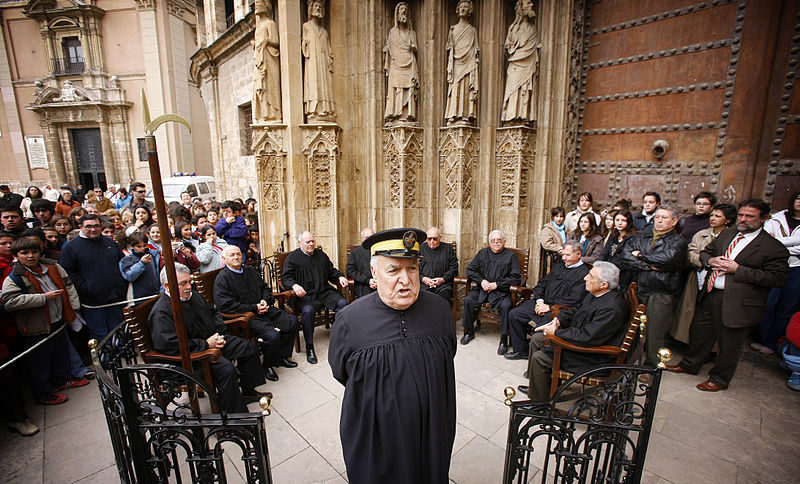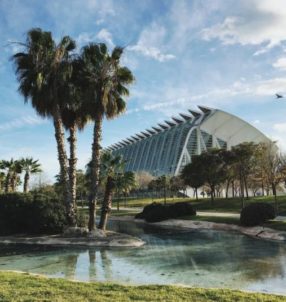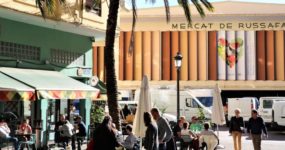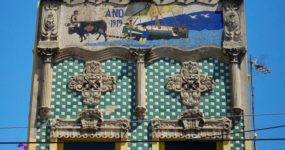On the doorstep of Valencia’s Cathedral, the Puerta de los Apóstoles de la Catedral de València, a group of people in black robes ascend the cathedral steps. No, not monks or farmers. They are Judges of Europe’s oldest continuing legal institution, the Tribunal de las Aguas (the Water Court). This body meets every Thursday at 12 noon to discuss the water issues of the city of Valencia and the surrounding farmland. Its mission is to guarantee the correct functioning of the region’s vast and complex network of irrigation channels and safeguard the interests of the communities of irrigation water-users.
The court’s primary concerns are issues of stolen water amongst Valencia’s farmers, when water is being used by a farmer when it is not their turn to irrigate their crops, a serious issue in drought-prone Spain and the irregular amounts of water provided by the River Turia. Issues have also occurred of farmers’ building works polluting the water channels, which are also brought swiftly before the court. Disputes can occur at any point throughout the year but they are more frequent during droughts when special rules are implemented regarding irrigation and “supervision is enforced to control the availability of water,” said historian Daniel Sala, a Water Court expert.
The court consists of nine members, a representative or síndic, from each of the areas corresponding to the seven ancient “royal water channels”, which make up the city’s ancient irrigation system, and a court bailiff. These officials are democratically elected by the 10,000 or so farmers that make up the inhabitants of the areas presided over by the Tribunal des Aigues, namely in: Valencia, Quart, Benàger-Faitanar, Tormos, Mislata, Mestalla, Favara, Rascanya, Rovella and Xirivella. Every two years one of the síndic is elected president
This court settles conflicts between irrigation water-users orally with no documentation, and most importantly quickly and cheaply. While the modern legal system could take months to work out a verdict, incurring hefty fees from lawyers, all disputes are heard and judged within the session that the complaint is brought to the court. If no one contests their decision in the next three sessions, their word is final. There are no appeals, and decisions are upheld by the respect in which the court is held and the trust placed in the judges’ decisions as they themselves are farmers and have first hand, expert knowledge of water customs and their everyday uses. A legal system of the farmers, by the farmers, for the farmers. Abraham Lincoln, take notes.
Proceedings begin when the bailiff, with the permission of the president, calls for cases from each of the canals in turn, with the traditional phrase “denunciants de la séquia de…!” (“claimants from the irrigation canal of…!”). Its president indicates with his foot who has the right to speak or reply, and declares “Parle vostè!” to pass the right to speak or “Calle vostè!” to withdraw it.The court is conducted entirely in Valenciano, and any fines imposed on those found guilty of stealing water, are fined in Valencian pounds, a long discontinued currency. However payments in Euros are graciously accepted. The proceedings are largely deemed as fair and impartial, and if a complaint of corruption or favouritism is brought against any of the judges, they will immediately remove their black robes and face the charges as citizens, before replacing their robe, or leaving it off forever according to the ruling of the other judges.
The rulings of the Tribunal apply to all members of the Valencian community, high and low. As was explained at this Thursday’s session, in times of drought, on some days those downstream of the City of Valencia would be allowed to water their crops, and on others it would be the turn of those upstream. This even applied to the Valencian nobles, who would often be growing Valencia’s most profitable crop, rice. The watering of this particular crop was heavily regulated during times of drought, due to the vast amounts of water it required.The court is not held in esteem by all however. At this Thursday’s session, a protester held up a placard protesting the alleged pollution of the waters surrounding the village of Naquera by a chemical company.
Even celebrity status does not grant you special access to the court, the only people allowed to sit on the court without being elected by the farming community are the King of Spain and the President of the Valencian Generalitat. Even these illustrious positions are not a surefire guarantee of entry. President of the Generalitat Emiliano Zaplana was denied entry as he failed to contact the court within his first year of office. Hell hath no fury like a tribunal scorned. Even brutal dictator Francisco Franco was not permitted to sit on the court, as he refused to wear the traditional black cloak instead of his military uniform.
This body has its origins in the time of Al-Andalus. First established under the rule of Caliphs Abd-ar-Rahman III and Al-Hakam II, in 960 CE. Given that water was so scarce in both the North African desert and the Arab Peninsula, water protection and governance would have been of paramount importance in these areas, which the Islamic forces brought into Spain. Indeed the irrigation system the Tribunal was set up to protect was established by the Muslim Caliphs. The Tribunal would originally meet inside the Mosque, but after the reconquista when the mosque was torn down and a Cathedral was built in its place, the Christian clergy ejected the tribunal from the Cathedral and said they should meet on its steps. The fact that it meets on a Thursday also highlights its origin in Spain’s Islamic period. Thursday is the last working day of the Islamic week, with Friday (yaum al-jum’a), being the day devoted to prayer and the Mosque.
Yet with the Reconquista’s notorious destruction of all things Islamic, such as the burning of the 1.5 million books in Granada’s Great Library, or the destruction of Valencia’s own Mosque, it begs the question, why did the new Christian council and clergy allow this legal body of Islamic origin to remain? It has survived for centuries and been integrated into the modern Spanish judicial system, with the same legal value and weight as any civil court. This is a testament to its effective and impartial contribution to the maintenance of the widespread and complex Andalusí irrigation system surrounding the city of Valencia, that made a once dry landscape into the fertile plain it is today. In 1238 with the conquest of Valencia by the Christians, King Jaume I, in concordance with customary water laws, donated the irrigation system back to the peasants of Valencia
Yet for all its long and storied history, the Tribunal de les Aigues is clearly in decline. The court depends on the survival of the cultivation fields of Northern Valencia, which are under serious threat due to urban construction. The expansion of the city has led to the disappearance of many of the old water channels and tributaries. The construction of a reservoir or embassement at Bengaber has greatly increased Valencia’s water stability. Great for Valencia but not so promising for the tribunal. These factors mean that it has less cases to hear at each session. Testament to this was this Thursday’s session which only heard one case from a plaintiff, and was attended more by schoolchildren and tourists than members of Valencia’s farming community.
The rural farming communities of Moncada and Del Oro have made applications to join the court, yet their applications were initially refused, and are now under consideration. Despite the fact that these two new communities would restore the court to its former glory, having these communities as part of its mandate would completely break with its long tradition of only supervising the seven ancient channels.
It is clear that the court needs to decide what is more important, tradition or survival. The history books are littered with institutions that refused to adapt to the times.
Report by Danny Weller
Article copyright 24/7 Valencia
Related Post
This site uses Akismet to reduce spam. Learn how your comment data is processed.

























Leave a comment